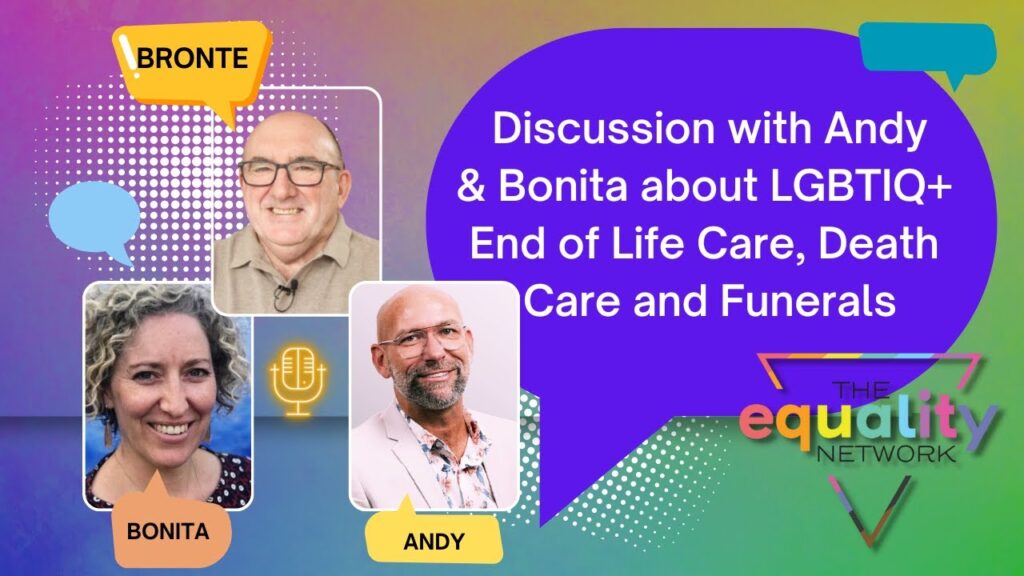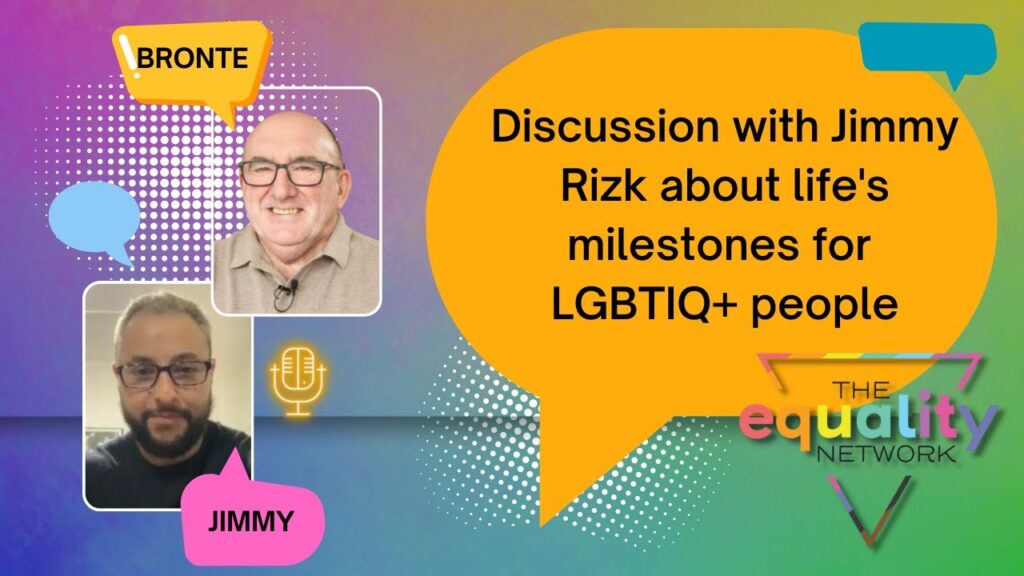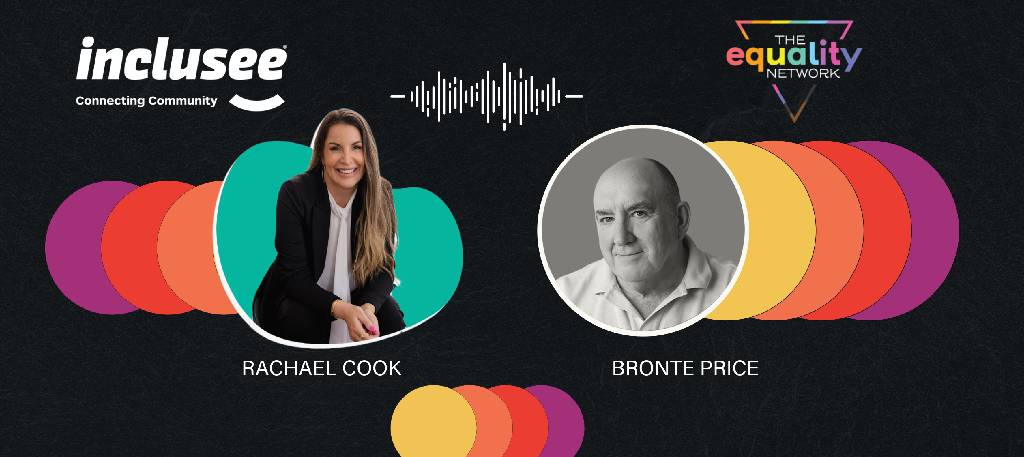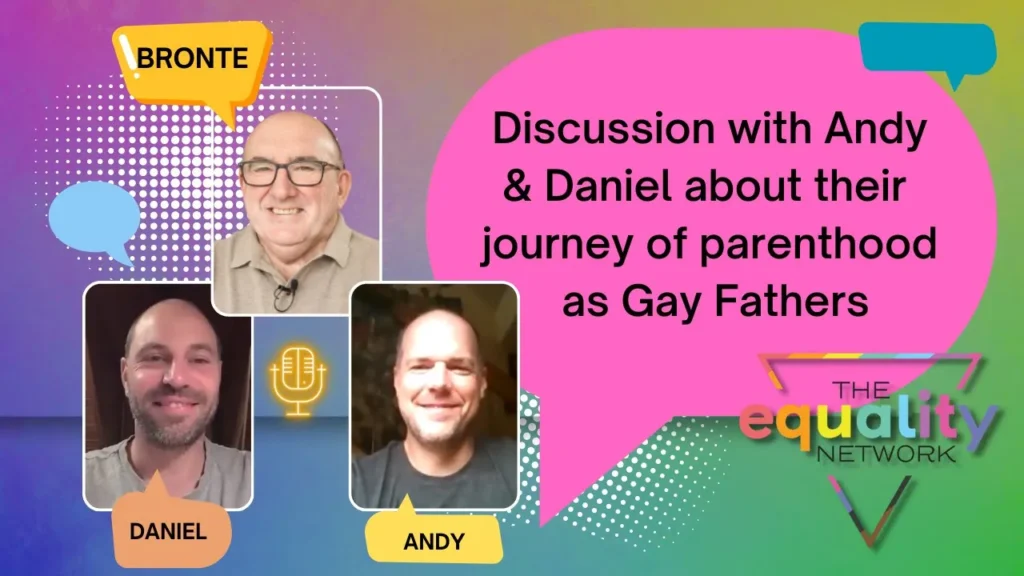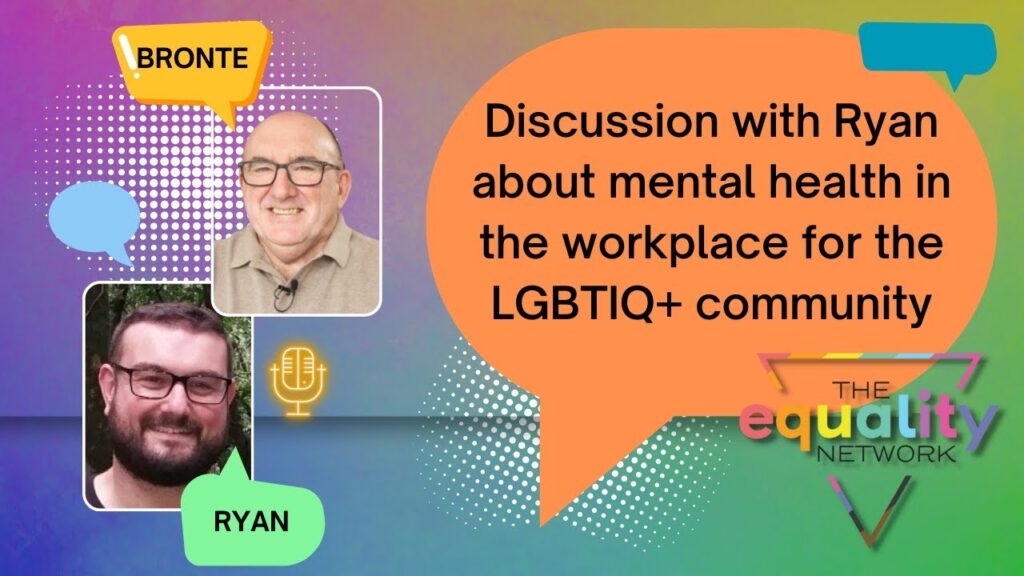Discussion with Jimmy Rizk about his coming out story as a trans man
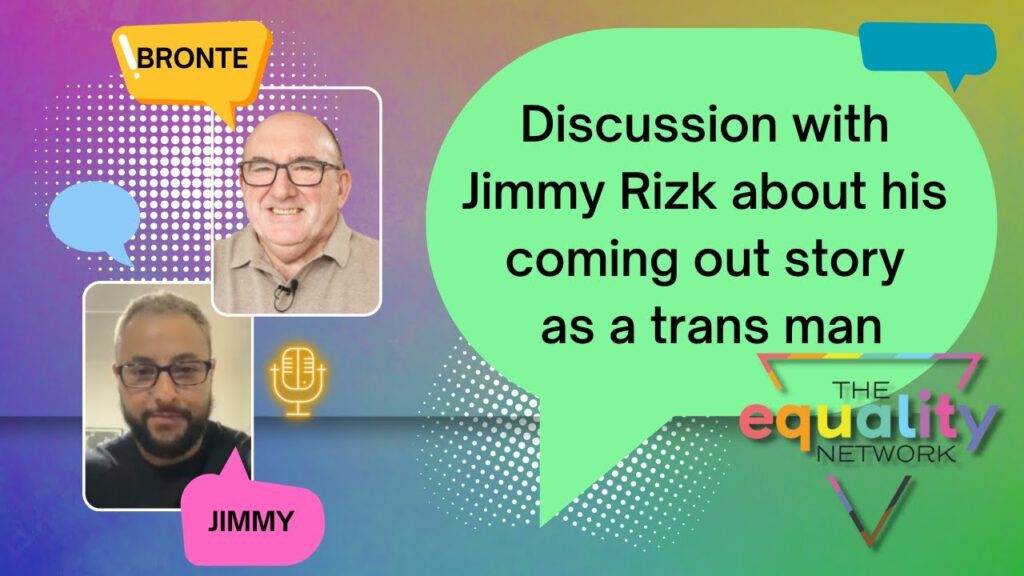
Not everyone is comfortable about coming out. If LGBTIQA+ people don’t feel safe, they’ll wait until it is safe to come out – some people will never come out.
For some people, the decision is sometimes made for them, by their gender expression and other factors. Coming out is different for everyone.
A safe space in which people feel safe enough to come out is markedly different from not feeling safe. We need to understand that coming out is not a single event – it happens multiple times.
That may be too scary for some people to contemplate – can they genuinely trust everyone they meet to respect their gender identity and sexuality? Will there be no negative consequences at all?
Watch the full video of the interview to listen to the whole discussion with Jimmy Rizk.
You can also check out this ABC News exclusive on Jimmy Rizk – Transgender carpenter hoping to build safer workplaces for queer tradies.
The key topics discussed in this interview were these:
1. Interview Jimmy Rizk, a trans man, about his coming out story.
· let’s get the language right – please introduce yourself and tell us your gender identity and sexuality
· can you please tell us what life was like for you as a child?
· what’s it like to announce that you’re trans and are transitioning?
· what are the major thoughts that go through your head in that process and at that time when you come out as trans and begin to transition?
· is coming out as a trans man different from coming out as a gay man?
· what was the response of your family when you announced you were transitioning? And what was the response of your friends?
· what have been the major struggles for you?
· has it got any easier as time has gone by?
· who / what was the greatest support for you when you came out?
· what were the impacts of you transitioning – eg your mental health, relationships, family, career, friends, etc
· as a trans person, tell us what gives you hope, looking to the future? is it more about the perceived negative effect on career or about social exclusion (losing friends and family), or both?
· what impact does being closeted have on the individual concerned?
· what can people – friends? Family members? – do to make it safer for people to come out?
· tell us about your experiences of people who haven’t been inclusive – and those other experiences of people who have been inclusive, affirming and embracing of you
· tell us about the biggest highlight of you coming out and of transitioning
· what’s it like coming out in 2022, do you think, compared with years ago – have we really made progress?
· why do LGBTIQA+ people continue to live in the closet, do you think?
· why are some people still fearful of coming out in 2022?
· what advice would you give to someone who is considering coming out?
· why is it important to celebrate coming out and transitioning?
· do you feel that you’ve had to ‘blend’ in at work and ‘go along’ with behaviours that you normally wouldn’t?
· is there anyone in the workplace that you have trusted enough to confide in or is your workplace completely unaware?
· why did you choose the construction industry of all industries?

Transcript of the interview with Jimmy Rizk about his coming out story as a trans man
Bronte: Hi! My name is Bronte Price. I am a cis gay guy and I’m the founder and manager of The Equality Network. Welcome to this safe space discussion where we have regular chats with individuals from right across the LGBTIQA+ spectrum. The main aim of all of these chats is to gain a greater and deeper understanding of the whole community. Today, we’re joined by Jimmy Rizk, who’s going to introduce himself. So, welcome Jimmy, and thanks for coming on board today.
Jimmy: Thank you very much for having me. It’s a pleasure to be here.
Bronte: So, let’s get the language right. Tell us about your gender identity and your sexuality, if you will, please. Your pronouns.
Jimmy: No worries. Okay, so I go by ‘he/him/his’. I identify as male, but I’m a transgender man, and my sexuality is pretty fluid.”
Bronte: “Okay, thank you very much. Can you let’s go back to the start, I guess, and tell us a little bit about what your life was like as a child?”
Jimmy: “Okay, well, growing up, I think I always knew how I felt in terms of being trans. I was a really happy kid, and I don’t think I felt particularly bothered by the way that I felt inside, apart from just being frustrated at my body. I was surrounded by a loving family, lots and lots of cousins, being a big family. Things were really great.
Bronte: It was a happy childhood, right?
Jimmy: For sure. Very colourful, full of love, adventure, and excitement. We’re very passionate people in my family, so that always featured heavily. Still to this day, I’m a very passionate and excitable person. My life was very colourful, you know.
Bronte: So, thanks. So, you got to a point in your life where you decided to transition and to announce that you were trans. Tell us how that occurred, please. What was the thinking in your head, and what were the emotions going through you?
Jimmy: Well, like I was saying before, I always knew that I was trans. I didn’t have the language to describe it. But I kind of grew up, went through puberty, and was feeling more and more uncomfortable with my body. I was recognising that quietly in my own mind because I really didn’t dare verbalize that to my peers or my family at the time. And yeah, I guess kind of moving into my first year of university, that was when I really started feeling it. I think as well because up to that point, I had existed as a very androgynous person.
No gender role specifically had been placed on me. I was pretty carefree. I just felt like I was who I was. But getting into my late teens, early 20s, I felt that there were certain social expectations on me.
Um, you know, obviously my physicality, and noticing, you know, a greater and greater divide between like cis-men and cis-women, so it really started to take a toll on me. Uh, you know, I guess I was coping at the time with a lot of alcohol to deal with the chaos in my own mind.
But I had stumbled across a lot of Tumblr pages that I remembered from back then. That’s when I started to actually discover what it was to be transgender – actually learning the word and having a definition for it.
Then, going, “Oh my God, that is how I feel!” and I didn’t realize that was something that was shared by more people than just me. Um, so I started to be like, “Oh, this is something that happens,” and then on top of that, I was seeing people mainly in the States documenting this start of their transition journey.
I was like, “You can do something about it!” That was like, blew my mind, you know, because I always felt stuck, I guess. And so, I’m a silver lining kind of guy, pretty happy-go-lucky. I was like, Oh well, look, just make the best of the situation, this is your lot in life, just have fun to the best of your ability, be a good person.
But then seeing that I could actually do something about it just opened up this whole new world to me and a whole new future – a vision for myself, you know? Um, and I just became really fixated on it, and I would spend hours and hours into the early morning just trolling the internet, reading things, watching things – essentially doing this giant research project on what it was to be trans, what I could do, and how the system here in Australia worked in terms of transitioning.
Yeah, I spent a couple of years kind of playing around with that in private until I eventually was like, “You know what? I think I want to experiment with a social transition.” So, I told my partner at the time, and I told a couple of my close friends, and I just tried on a new name, tried on some new pronouns.
Because I didn’t want to commit to something so publicly unless I knew that that was actually what I needed and what I wanted. So, I guess being that young age as well, it kind of gave me the freedom to be a bit experimental. People expected someone that age. Um, I’m sure my family noticed that I was a little bit more androgynous than I was before, but people just kind of let it go. Like, ah, I mean, they used her back then.
She’s just yeah, doing something, you know?” So, I just played around with it because I needed to know before I presented it to my family, especially.
And my friends and partner at the time just really allowed me to do that in a safe way. So, I was super lucky, wow. Um, but, you know, I did come up against some people that would question me or hassle me or just not understand, so it was tricky to navigate.
But, yeah, that started it for me.
Bronte: Thank you. So, the social transitioning at that age, and you’re right, I think that you’re at that age where society kind of gave you this licence, even this expectation, to experiment with sexuality, even gender, perhaps, in them now. Um, were there differences in your research project that you did find some differences between the United States experience and what you found about transitioning in Australia? Were there any differences?
Jimmy: Um, well, the first difference was that it was very hard to find anything about transitioning in Australia. The US was way ahead of us, and it seemed more common, not that it was common, but you know, they had surgeons and endocrinologists who were involved in helping people transition.
Whereas here, I desperately looked for things and I’d have like random little blog entries on some big forum, and someone talking about something and I’d try to look it up, and maybe I’d find something else, or like that wasn’t, I don’t know, relevant anymore, or it was really hard.
So, I found that when I first started transitioning, I didn’t really know what to do, who to go see, and the people that I did see also didn’t really seem like they knew what the process was because this is back in when it would have been, maybe around then.
And that was definitely before it had become a mainstream thing that was understood. You know, I can only imagine what it would have been like before that for trans people.
Bronte: That’s right. And so, you had a kind of a support network, a type of group of your tribe, against whom you could be safe, before you could talk about transitioning, at least socially, safely. They were really critically important to your decision to keep transitioning, is that right?
Jimmy: Yeah, absolutely. I mean, it showed me straight away that if I was choosing my truth, that people are going to be there, people that genuinely loved me and cared about me. And, you know, you can tell when you’re looking at somebody and they’re being honest with themselves and with the world around them.
So, I actually think the majority of people will support that, you know, unless they are so deeply afraid of something that’s not status quo or whatever. But I think we have to give maybe more people credit. I don’t know, this is just my experience, and I don’t think it really reflects the majority, because I guess it was hard, and maybe it’s my perspective that I choose to adopt, but on the whole, I felt very supported.
And I didn’t think that I was going to bed, yeah okay, you know, and I would have done things sooner had I known that people would be there. But I also didn’t have the expectation of people to get it right away. I think I managed my expectations, and so I never felt disappointed.
And I mean, any human that’s confronted with new, challenging information, it takes us a while to integrate it before we can understand it and then apply it, you know. So, I think I tried to be tolerant of people because yes, I deserve respect, but also, like, we don’t all just get everything straight away, you know.
And I think that when you show people a little bit of patience and compassion, you receive that too.
Bronte: And you get it back, don’t you?
Jimmy: So, yeah.
Bronte: That was going through your head in that time, and you took a little time to transition or to just work out what you wanted to do in your own head and in your own space. The thoughts that were going through your head, were they confusion, were they thoughts around where do I get information and support? where do I find my biggest supporters?
Jimmy: Hmm, put myself back into that headspace. It’s been such a long time. I think sometimes I’ve just rewritten things.
Bronte: It’s okay to say that is the answer.
Jimmy: Yeah, I’ll um, I think probably, I think actually the thing that was the main thing going on in my head was that I just had to survive. And I knew that if I stopped and let myself feel the weight of what I was choosing to do. Because to me, it’s not a choice, but I chose to pursue a medical transition. Then I feel like I would have lost my momentum, and I could have really crumbled. It could have prolonged the stagnation of my life, because that’s what happened for a few years. My life didn’t progress because I couldn’t.
So my mentality was just to take a step, take a step, just keep going. Because whatever people are gonna have issues with it, or I’m going to come up against roadblocks, I just need to keep going. Because if I don’t, I’m not going to get through it.
Bronte: So, the first step was social transition, just safely and gently. How was the first step with regards to the medical transition?
Jimmy: Um, yeah. So, I kind of did things a little bit back to front, in terms of I had surgery before I started hormones. Yeah, um, and that was because I was already passing maybe half of the time before hormones. So, yeah, I just needed to have surgery on my chest done because I was like, I can’t. Like, that for me was a major thing. I was like, I just can’t deal with it anymore.
I don’t want to bind. I’m big on comfort, and to have to bind every day, um, it just didn’t sit well with me. I didn’t like what it was making my body feel, and it was too much of a constant reminder. So, yeah, that was my basically first step in terms of my medical transition.
Um, and then I think it was maybe close to a year after that I started hormones.
Bronte: Okay, okay.
Jimmy: Um, yeah. And pretty much as soon as I got on hormones, my life changed drastically for the better. Yeah, um, like I just can’t even begin, now that I’m thinking about it, which I, I don’t reflect on it a lot, yeah, but when people ask me, I do, and I’m like, oh wow, like it’s right now I’m just going for the first time, actually, it was the hormones that really enabled me to feel like I could operate in society as just your everyday person.
Bronte: It’s ended, surely, it’s a confidence thing.
Jimmy: Oh, absolutely.
Bronte: I mean, this new persona.
Jimmy: Yeah, yeah. And because I always knew who I was and how I felt, but you know, we’re very visual people, so the world sees you, and then they go, okay, that’s who you are. So, I was just tired of having to reassert, no, this is who I am all the time, and now I don’t deal with that at all. I pass almost 100% of the time. Most people that meet me don’t know that I’m trans, so if I want to tell them, I have to out myself purposely.
Um, you know, I feel super lucky because I guess this is what I wanted. I know some people don’t necessarily want to fly under the radar. They want to maintain some of their trans visibility, or they want to inhabit in between, but for me, like, it’s a very clear, like, I am on the far end of the spectrum of male-female. I’m bang right on the end, so this is everything I could have ever dreamed of.
Like, in my life, in my body, I feel so happy. I feel so good. I never could have imagined it would work this well you know.
Bronte: Tell me, if you will, about your new cultural background and the response, not only of your friends, but particularly of your family, your parents please.
Jimmy: So, my dad’s family is Lebanese. My dad was born there and migrated with his siblings. My mom is Spanish and Italian. My dad’s side is Shia Muslims, and my mum’s side is Roman Catholics. They all come from the villages, and it’s actually quite traditional in a lot of ways.
You know, the way they think. There are a lot of gender roles. If you kind of think of the stereotypes, I think that my family could fit it. You know, that’s a very one-dimensional view of them, but yeah.
So, I was terrified to tell my family because family, to me, is everything, and that’s part of our culture too. It’s like family is everything.
Bronte: Yeah.
Jimmy: Feeling that and knowing their attitudes, being quite conservative at times and traditionally religious, it was probably the hardest thing in my entire transition to tell my family. I put it off for a few years. I had surgery, and I didn’t even tell my extended family.
Bronte: Wow.
Jimmy: The only reason I told my extended family was that I was on testosterone, and I was like, these guys are gonna find out. They’re gonna notice when you start growing facial hair, and your voice breaks, and you lose your hair. Yeah, so I was like, I have to tell them. There’s no way I can get around this. I was at a point where I was like, do you know what? If I lose them, then so be it, because at the end of the day, I’m the only one responsible for my happiness, and I was sick of living for other people’s comfort and peace of mind, you know.
I didn’t want to rock the boat, but I had to because this is my life. I’m living it. Nobody else is, so you know. But that’s why I had to be sure, and that’s why I had to experiment because if I just… I was at risk of losing too much.
Bronte: Yeah.
Jimmy: Yeah, so I told them, and to be honest, they surprised me with their ability to accept me even though they didn’t understand. I don’t know if that’s part of the religious thinking coming into it and that we are compassionate towards all people. I don’t know if they just love me so overwhelmingly and unconditionally that it didn’t matter, or it’s probably a combination of all things, but the person I was most afraid to tell was my nana, my mum’s mum. She’s my only living grandparent, and she was 44 when I was born, so I’ve known her for almost half her life. I’ve been very lucky, and we’re close. We’re really close.
She’s very outspoken, very traditional, very, very religious, matriarch of my family, who I revere and respect so much. I wrote to her, and I was just at a point where I was like, I’m not asking them for their support, I’m just telling them, “Hey, this is what I’m doing, this is who I am,” and if you want to come along for the ride, you’re obviously more than welcome to.
But I had to put it that way for myself because I was like, if I’m looking to them for approval, that’s wrong. I have to just know and just tell them, “Hey, this is what I’m doing.”
And she wrote back to me and said, ‘Ah, that was such a well-written email.’ That was the first time she was just so proud of the way I could express myself through words.
Um, and she’s like, ‘You know, like, I’ll always love you.’ That was very short and sweet. Then I went to her house because I needed her to have time to digest. I didn’t want to spring it on her, and then just wait for the first reaction.
So, I went to her house, we sat down, had coffee, had some things to eat, and then we got down to it. I told her I was really scared to tell her. She’s like, ‘I don’t know why everybody’s so scared to tell me things.’ You know, she just made it seem like it was okay to talk about that stuff.
Um, but I’d never had a conversation with her like that ever in my life. She said to me, ‘I didn’t know what it meant, so I had to Google the word transgender.’ But even that, you know, she didn’t understand, and she’s like, ‘I need to understand. This is important.’ She took it upon herself to educate herself.
Bronte: Wow.
Jimmy: You know, and I was just really blown away. Yeah, and I mean.
Bronte: How old would she have been at that time when you had that conversation with her?
Jimmy: I reckon she would have been in her mid 60’s.
Bronte: Yeah, okay. They surprise you, don’t they, older people. We think the old one honestly is just gonna lose and disown me or never talk to me again, and here she’s Googling the term transgender to find out because she wants to find out, she wants to learn.
Jimmy: Yeah, I just, it was wild, honestly. I was just shocked, you know.
Bronte: Wow.
Jimmy: Yeah, we sat down for like two, three hours just talking and talking about the issue of home, issue you know, what happens with, you know, if I want to have the family because that’s super important to us. Um, you know, then my choice of partners, like what I’m attracted to.
But I think because I am generally romantically attracted to women, might not have found it much easier to understand me, whereas my younger sister is lesbian, and I’ve got a few gay cousins, and she struggles understanding their relationships. I think she’s welcoming and warm to their partners, like it’s out in the open, it’s not, you know, hidden under the rug kind of thing. But I just feel that she doesn’t understand that she very much is in her mind needs to be a man and a woman, but so it’s bizarre that being trans, I’m cool.
Even I feel more accepted than if I were to just come out as a lesbian. You know.
Bronte: Wow. Um, you alluded to the fact earlier that there were some people who weren’t quite as embracing as your family. Do you want to, obviously in an anonymous way, but just give us an example of the sort of hurdles socially that you had to go through and the period, please.
Jimmy: Yeah, I mean, I’ve had men on the street asking me at night to basically pull down my pants to prove my gender through my genitals. Um, and you know, I’ve just had, well, even just people that fetishize it a little bit, which I don’t know, I’m not really sure how I feel about that. But sometimes I think it can make you feel like you’re not seen as a human. Yeah, you’re seen more as a novelty sometimes.
Bronte: Yes.
Jimmy: Yeah, and that does get to me a little bit because I’m very big on preserving a sense of humanity. You know, we’re all connected, we’re all equal, and that can get to me. Um, oh, I’ve had people on the train ask me if I’m a boy or a girl, like a group of young guys, and then I’m scared that I’m going to get bashed, basically.
It was only for a couple of years before I was on hormones that I encountered people that made me feel unsafe, but you still carry that fear with you. I mean, I’m afraid that if I get stopped roadside for a breath test or whatever, or I’d be pulled over for speeding or whatever, I’m like, what’s gonna happen here?
You know, it’s just a fear that I carry. Or like in the change rooms at the gym, I don’t know who knows that I’m trans there, but like I’m out publicly, and I know there are some guys from crying throughout my gym, so then I’m like, well, am I actually maybe in danger here? I don’t think about it too often.
Bronte: Every now and then that thought is there, and it’s for some of the signals that this might be a bit of an unsafe area, or I just better watch my speed because, you know, I don’t want to get pulled over.
There are still surely unsafe places, particularly for not only but especially for trans and gender diverse people. I think I’m also perhaps more so than the rest of the LGBTIQA+ community, and you see that in simple places. It can be at a supermarket, on a train, or at the gym. Do you want to talk about what you do for a job?
Jimmy: Okay, yes. So, I’m a carpenter, and I run my own carpentry business. Yeah, lots of construction workers around.
Bronte: I’ll leave that for another time, but that’s fascinating, I think. So, you talked earlier about the really beautiful difference it made to not only your self-identity and your self-confidence but also your mental health, and that continues, right?
Jimmy: Oh yeah, all the time. But I found that the medical transition at the start alleviated a lot of critical stuff. You know, it got rid of the sense of urgency for a lot of my mental health stuff and all that. But I kind of just started my medical transition and filed the rest of the stuff away. Now that I’m, I don’t know, seven-eight years into my transition, and I’m older now, turning 30 in two days. I’m now at a point where I’m reflecting a little bit more on the enormity of it.
And I still carry a lot of insecurities. I’m recently single as well. I was meant to be married at the end of last year, but that fell through. Re-entering the world, you know, a bit damaged and heartbroken, but also as a trans person who hasn’t been in the dating world for a long time, I find that I’m always really nervous.
You know, I have this dialogue sometimes like, ‘Oh, nobody’s going to want to be with me. I’m a freak, you know, and it’s not the case. I mean, no, I’ve been having a very good time.
Bronte: Thank you.
Jimmy: But yeah, it’s something that I think about every now and then. I’m like, who’s going to want to spend their life with somebody who’s trans? It’s going to make having children more complicated for them or make things with their family complicated. There are so many things that I’ve already had to address when I’ve decided to go on this journey, but for them, it’s a choice. Do they want to accept that for their life? So, you know, I worry about that.
Bronte: I understand that. I wonder what kind of things, as a trans man, give you hope for the future, particularly around the future people who were who we were 10-12 years ago. What sort of things now give you hope for trans people?
Jimmy: I think just the fact that I see it almost everywhere now. It’s not something that’s hidden in the dark anymore. We talk about it. People talk about it over family dinners sometimes. Like there’s a conversation, and that’s the start, you know?
And I think slowly over time, people’s attitudes are changing because they’re exposed to it. I feel like before, people had this really niche idea of what it was to be a trans person, and they thought that we suffered and we had a chip on our shoulder and all this kind of stuff, and that was the reason why I started talking about me being trans because I was like, ‘Hey, I’m trans. I’m super happy.
I just want that to be part of our narrative. I want people to know that there are trans people out there who run their own businesses and who have heaps of friends and still have their family around them, and they have successful intimate relationships, and they can have a family.
I want people to know that trans people have fulfilling lives.’ I just used to get so frustrated by any time I had seen something about a trans person or heard somebody talking, it was always like, ‘Oh, you know, someone being like, it’s so hard, it’s so hard, it’s so hard,’ and yeah, it is hard, but so are a lot of things.
I don’t know, maybe other trans people would be upset at me saying that, I don’t know, but I just think, ‘Let’s just change the narrative a bit, so that people need to know who we are, not just a caricature of us,
Bronte: That’s right, um, that’s a stereotype.’ Yeah, and there are lots of positive stories coming through that we’re hearing often now. We’re seeing many more people who are trans transitioning, but also telling their stories, ranging from kids quite young from primary school who are coming out as trans people and beginning to transition, to older people in their 60s and 70s who have decided – Yeah, there’s been a certain event in their life that’s now led to them deciding that okay, I need to be my authentic self for the rest of the time I’m on Earth.
I think one of the big things that’s happened over the last years, Jimmy, is the amount of support, the number of support structures, organisations, leaders, activists, and cultural changes who have told their stories but also not taken the crap anymore. We’re not gonna put up with it anymore, and on that front foot, and they’ve been individuals like you who have been willing to tell this story just one by one and educate people in the general population a bit more. I think.
Bronte: That’s it, just making the population familiar, because we’re all just scared of the unknown, and none of us want to be ostracised. A lot of cis people think that they’ll be ostracised for accepting or celebrating trans or queer people, and it’s like, no, come on, jump on the bandwagon, like the more the better, you know.
Bronte: It’s kind of weird that being gay by association with a gay person was back in the ’80s. You know, I made some gay people close that closet door even more firmly than it was before. If you were to give some advice to a young person who’s perhaps watching this video interview and they’re thinking about the sort of thing that you were thinking pre-transition, what would you tell them? What advice would you give them?
Jimmy: I think I would say, “Trust your gut. If you’re feeling something and you’re questioning something, run with it. You’re not going to lose out by exploring and experimenting and finding yourself. It’s important to also give a few close people around you your trust because you are going to need people to love you and to bounce ideas off and give you a space where you can talk about things that you might be concerned that other people would question you too much for. You need a sounding board because when you’ve got all of this stuff going around in your head, it’s just too much.
Bronte: Tell us why it’s important to celebrate and tell our stories about coming out and also about transitioning. Why is that important?
Jimmy: I think celebrating anything is important because it’s joyful, and it makes you feel connected, and we need that. Trans people need that. We need to also be proud of ourselves. When you’re celebrating something, you’re proud of it. When you’re telling your story, you’re proud of it. If you’re feeling ashamed, you’re probably not going to share, so we need to reinforce this idea that it’s worth celebrating. We’re worth celebrating.
Bronte: Thank you. And thereby helping normalise.
Jimmy: Absolutely.
Bronte: Have those conversations rather than just assume based on some old dead stereotypes.
Jimmy: Yeah, exactly.
Bronte: Jimmy, thank you for being so open and so generous with not only your time but also some very intimate details of your coming out.
Jimmy: Of course.
Bronte: We’ll be certainly in touch with you for some further safe space conversations and chats, and all the very best. Thank you.
Jimmy: Thank you so much for having me.
Bronte: Cheers.


